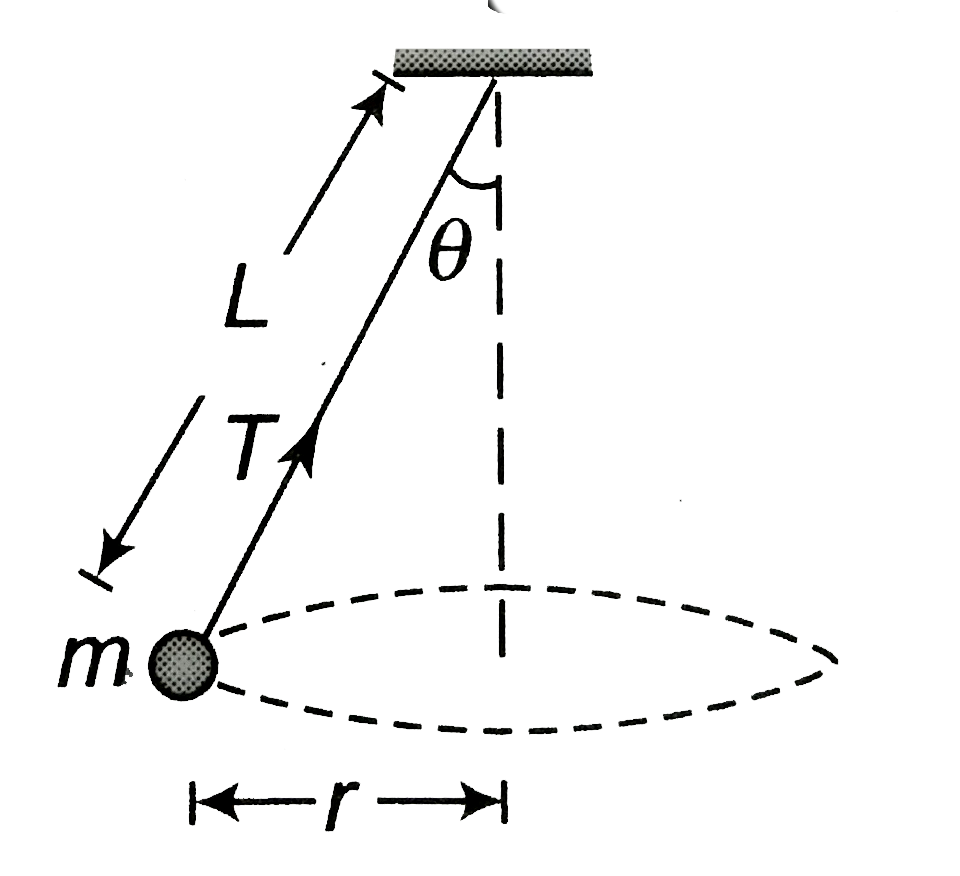A particle of mass 1 kg slides in a horizontal circle of radius 20 m with a constant speed of The only forces in the vertical direction acting on the particle are its weight and the normal reaction, however no information is available about the forces in the horizontal plane. Over a period of time whole energy dissipated due to work done by friction is conducted to ground and simultaneously radiated to surround. If the coefficient of friction is Then (Take g =10 m//s^(2):
The magnitude of frictional force acting on the block must be 5 N
The frictional force must be in tangential direction.
The frictional force must be towards the centre.
No comment can be made about the direction or magnitude of friction based on the given data.
The correct Answer is:A, B
Here there must be some force providing the centripetal acceleration for circular motion but we are not concerned about it any option.As the bodyis sliding the kinetic friciton on the body must be and it will act in tangential direction i.e. oppositeto directionof velocity.
Topper's Solved these Questions
- HEAT TRANSFER BOOK - PHYSICS GALAXY - ASHISH ARORACHAPTER - HEAT TRANSFER EXERCISE - Unsolved Numerical Problems for Preparation of NSEP,INPhO&IPhO
66 Videos
- HEAT TRANSFER BOOK - PHYSICS GALAXY - ASHISH ARORACHAPTER - HEAT TRANSFER EXERCISE - Numerical MCQs Single Options Correct
94 Videos
- HEAT AND THERMAL EXPANSIONBOOK - PHYSICS GALAXY - ASHISH ARORACHAPTER - HEAT AND THERMAL EXPANSIONEXERCISE - UNSOLVED NUMRICAL PROBLEMS FOR PREPARATION OF NSEP, INPhO & IPhO
82 Videos
- Kinetic Theory of Gases and Gas LawsBOOK - PHYSICS GALAXY - ASHISH ARORACHAPTER - Kinetic Theory of Gases and Gas LawsEXERCISE - Unsolved Numerical Problems for Preparation of NSEP, INPhO & IPhO
64 Videos
Similar Questions
Knowledge Check
If a particle of mass m is moving in a horizontal circle of radius r with a centripetal force (−1/r2) , the total energy is
A−4rB−2rC−1rD−12rA paricle of mass m is tied to a light string of length L and moving in a horizontal circle of radius r with speed v as shown. The forces acting on the particle are
 AmgandTBmg,T,mv2rdirected in wardsCmg,T,mv2rdirected outewardsDmv2ronly
AmgandTBmg,T,mv2rdirected in wardsCmg,T,mv2rdirected outewardsDmv2ronlyIF a particle of mass m is moving in a horizontal circle of radius r with a centripetal force (−Kr2) , then its total energy is
AK2rB−KrC−2krD−4Kr
A particle of mass m is moving in a horizontal circle of radius r, under a centripetal force equal to (−K/r2), where k is a constant. The total energy of the particle is -
View SolutionA particle of mass m is moving in a horizontal circle of radius r, under a centripetal force equal to (−K/r2), where k is a constant. The total energy of the particle is -
View SolutionA particle of mass m is moving is a horizontal circle of radius x under a centripetal force equal to −(kv2) where it is constant The total energy of the particle is
View SolutionA particle of mass 5 kg moves in a circle of radius 20 cm. Its linear speed at a time t is given by v=4t, t is in s and v is in ms−1 The net force acting on the particle at 1 = 0.5 s
View SolutionA particle of mass 100 g is thrown vertically upwards with a speed of 5m/s. The work done by the force of gravity during the time the particle goes up is
View Solution
